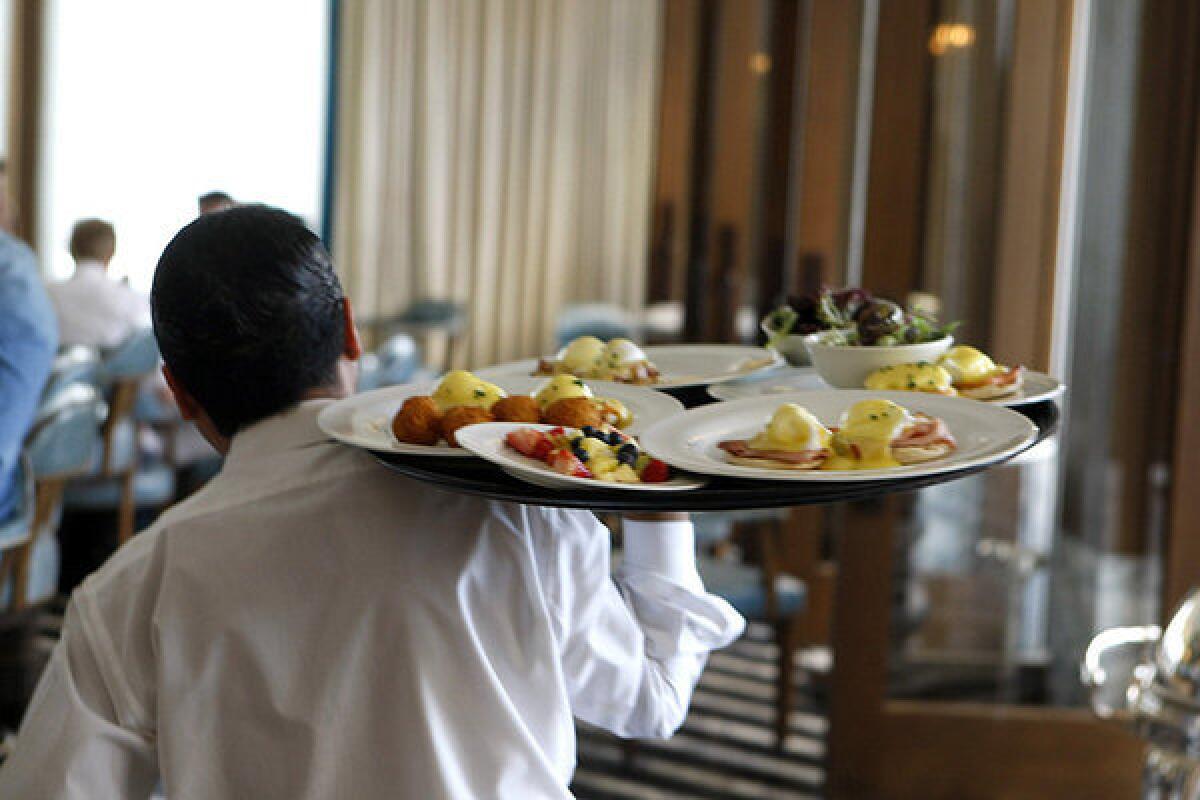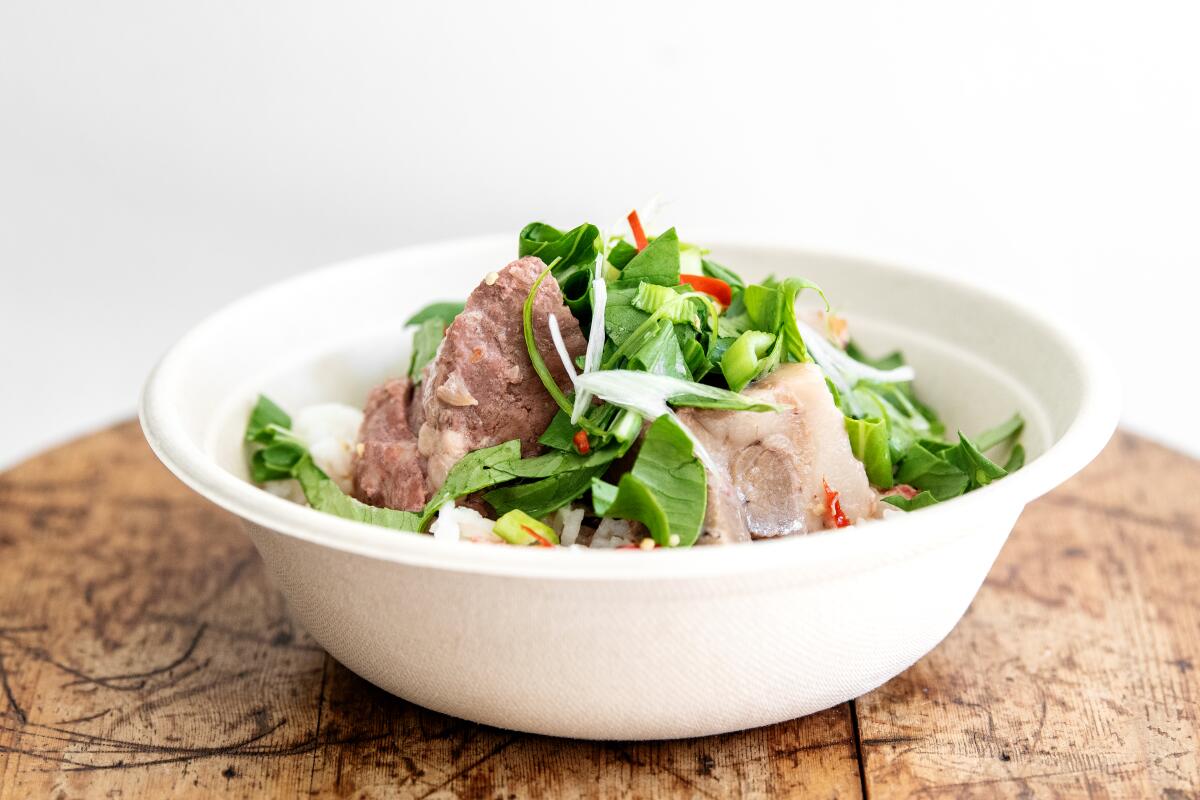The summer when restaurant workers rose up

- Share via
Earlier this week I was contacted by a journalist friend working on a story about restaurant criticism in the COVID era. She asked how I plan to approach writing about restaurants when restrictions on indoor dining have been lifted and things have “returned to normal.” (Quotation marks are my own, because normal seems out of the question these days).
As I considered the question, groping vainly for some insight or scrap of wisdom that might help forecast the future, I remembered something author Mark Lilla wrote earlier this summer: “The post-COVID future doesn’t exist. It will exist only after we have made it.”
So this is what I told my friend: Restaurants are changing, and the way journalists write about them may change too. This summer we saw restaurant workers speak out across the country, organizing for higher wages and better work conditions, some people broadcasting painful private grievances about sexism, racism and abuse in the workplace onto a growing network of anonymous “86’d List” Instagram accounts.
Chefs have long been at the center of the culinary universe (New York Times critic Tejal Rao recently charted the rise of the “imperial chef,” the “lone genius in the kitchen” who “doesn’t just manage the staff behind a great restaurant. He is the great restaurant”), but I hope we’ll see more food journalism oriented toward the stories of restaurant workers, especially as servers and hosts find themselves at the center of many COVID-era safety regulations.
In Philadelphia magazine’s “This Could Be the End of Restaurants as We Know Them. Maybe That’s Not Such a Bad Thing,” Alex Tewfik makes an impassioned case for not simply saving the restaurant industry but changing it, arguing that worker exploitation is “baked” into a system that relies so heavily on low-paid workers. The pandemic has brought into brutally clear focus the faultlines running beneath the American restaurant industry — the long-standing culture of abuse, harassment and exploitation in professional kitchens; the lack of health benefits, compounded by the threat of exposure, that has made restaurant work increasingly dangerous; and the growing sense that a business model predicated on paying workers minimum wage is fundamentally flawed.
If there’s a good time to reconsider the old models, this it it. What do you think? Email me at patricia.escarcega@latimes.com.
Enjoying this newsletter? Consider subscribing to the Los Angeles Times
Your support helps us deliver the news that matters most. Become a subscriber.
Some news
The L.A. Times Dinner Series kicks off Sept. 5 with a three-course collaboration meal between Jon Yao of Kato and Mei Lin of Nightshade; the menu includes dry scallop porridge and pork belly ssam. Dinners will be picked up on the day of the event, and my colleague Lucas Kwan Peterson will host a video chat with the chefs while participants dine together online.
In addition, the Los Angeles Times Food Bowl, usually held as a monthlong series of events in May, will go on this fall in virtual form, with World Central Kitchen and the Los Angeles Regional Food Bank as partners. Events include a cook-a-thon fundraiser Oct. 17; cooking editor Genevieve Ko, cooking columnist Ben Mims and senior food writer Jenn Harris will cohost 30 chefs and celebrities from Los Angeles, the nation and the world. The Food team compiled an accompanying guide for the year’s theme, “Takeout and Give Back.”
Have a question for the critics?
Our stories
— Bill Addison reports on the “entrepreneurial warriors” who have persevered during the pandemic to open new L.A. takeout restaurants.
— Outdoor dining in L.A. has been extended through the end of 2020, Garrett Snyder reports in this week’s Newsfeed. The caps on food delivery fees are sticking around a bit longer too.
— I love Genevieve Ko’s travel-inspired recipes, which are like vacation mood boards on a plate.
— Jenn Harris on Evan Funke’s next big move, a pizzeria inspired by the Eternal City.
— I’ve been wanting to make Ben Mims’ mood-brightening passion fruit sorbet since I read this description: “I mix their seedy, sunny pulp with syrup and orange and lime juices, then pack the churned slush into the passion fruit’s spent shells. The whimsy of the cute little cup is a great foil for our current heatwave-induced delirium and offers a respite from all that overwhelms us.” Sold! Have a great weekend, everyone.

Eat your way across L.A.
Get our weekly Tasting Notes newsletter for reviews, news and more.
You may occasionally receive promotional content from the Los Angeles Times.



